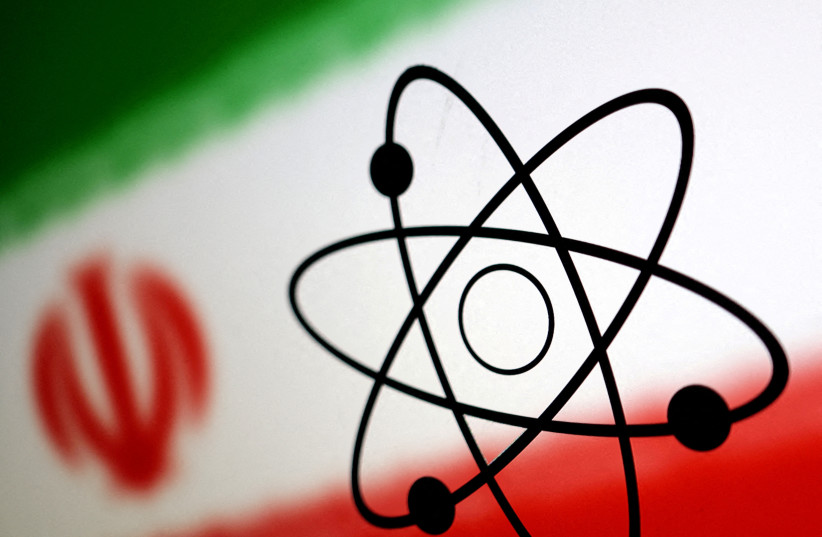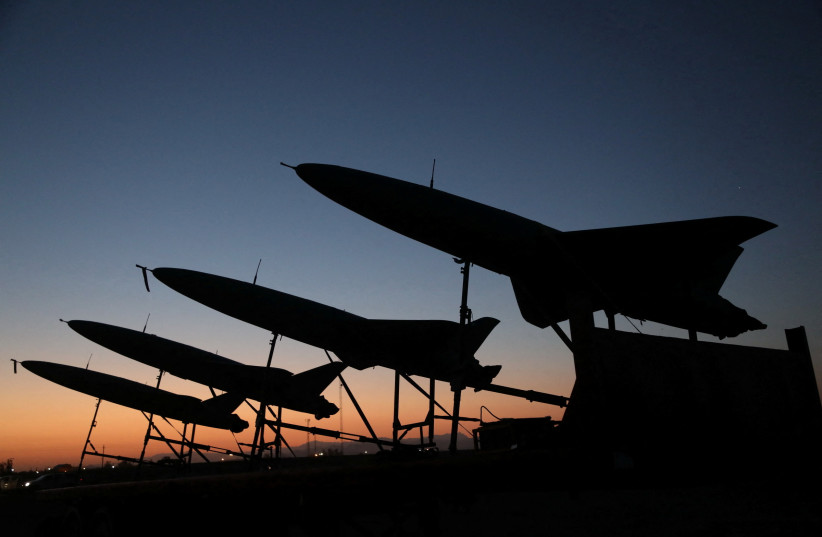The EU’s view on the Iran nuclear deal and standoff

Diplomatic Affairs: Europeans are furious with Tehran at a level not seen since long before the 2015 JCPOA deal.
The Jerusalem Post recently visited Brussels along with a group of journalists meeting with a wide range of top EU officials.
During the various meetings, the European Union’s view on the Iran nuclear standoff, with a number of significant revelations, became clear.
The EU isn't as worried as Israel
Starting with the most recent news, it would seem that the EU was worried by the February 20 leaked initial IAEA report about Iran’s enrichment of uranium to the 84% level, but still not as intensely worried as Israel.
First, the 84% for Israel was immediately smoking-gun evidence of Iran’s desire to break out to a nuclear weapon, since it is the equivalent of inches away from the 90% weaponized level.
In contrast, the EU view has been a wait and see approach to what the final IAEA report will say, while praying that it will not be terribly significant or will leave room for the whole thing being an accident – just as Iran has tried to spin the situation.
At the same time, the Post understands that the EU is furious with Tehran at a level probably not reached since long before the 2015 Joint Comprehensive Plan of Action, known as the Iran nuclear deal.
The two reasons have to do with the return to the deal being sabotaged by Iran’s negotiators in July-August, and then the ayatollahs providing drones to Russia to fight Ukraine.
According to the EU narrative, in July and August, all of the P5+1 were in favor of bringing the JCPOA back to life.
Impossible requests
In August, there was a full agreement and a text. But at the key moment, when all of the parties were ready to go to Vienna and announce a deal, the Iranians came back with multiple impossible and preposterous requests which they knew wouldn’t happen.
At this point, the Post understands, the EU recognized that the Iranians wanted the negotiations to fail because they were not yet ready for an agreement.
Iran wanted guarantees of the economic terms of the deal beyond the current term of the Biden administration, something the US could not legally provide, the EU knew.
Of course, there were also problems from the EU standpoint with the Islamic Republic trying to kill the IAEA’s probes into its unexplained nuclear anomalies (read: apparent violations which suggest a nuclear military goal) and with Iran killing large numbers of its own people protesting against the government.
But these were not nearly as fundamental a turning point for the EU as the mid-October revelation of evidence that Iran was providing drones to Russia and training Russians in Donbas to use the drones.
From the EU perspective, what Russian President Vladimir Putin is doing in Ukraine is an existential threat for Europe, with the belief that he will not stop in Ukraine. This means that Iran allying itself with Putin smashed through a variety of EU redlines.
The Post understands that the moment that evidence came out, it almost became impossible for the EU to go forward with a return to the JCPOA. This would be true even if the ayatollahs would suddenly drop their unrealistic demands for indefinite guarantees from the US on sanctions issues.
The dynamic changed radically, and really only the Chinese and the Russians still wanted to go forward with a return to the JCPOA.
Further, when the US says that it is not even spending time thinking about the JCPOA for now, because of Iran’s involvement in the Russian invasion of Ukraine, the EU can relate. Many EU officials who used to spend most of their time on Iran issues are now spending 80% of their time on Ukraine issues.
Curiously, the EU might claim that Iran stopped new sales of drones to Russia since late November, but it is unclear whether this would have to do with avoiding more global attention or simply difficulties using certain drones in the area’s winter conditions.
An equally curious point is that at some point there was a secret push to solve the issue by having Iran sell its drones to Ukraine instead of Russia. But it appears that this initiative never got off the ground, due to Tehran’s deep long-standing ties with Moscow.
By December, Iran realized it had miscalculated and tried to suggest a return to the JCPOA again, but it was still unclear whether it would do a straight return, and the Ukraine issue made a return politically unpalatable for both the US and the EU.
Still no alternative to the JCPOA
PARADOXICALLY, THE EU continues to stick to the view that there is no alternative to the JCPOA and that, somehow, the parties will need to find their way back to that deal.
According to the EU, since Iran’s nuclear program is now more dangerous than it was when negotiations restarted in April 2021, not to mention before that, and since the EU assumes any military move would only slow, not stop, Iran, the JCPOA is still the only end game.
When EU officials are asked about how a return to the JCPOA is possible when IAEA Director-General Rafael Grossi himself said in the summer of 2022 that Iran’s cutting off of portions of the IAEA surveillance equipment had dealt a “fatal blow” to restoring “continuity of knowledge” of the status of the nuclear program, it seems they disagree and feel the issue is bridgeable.
They would argue that experts have said thousands of times that this is impossible. But the truth is that the problem is not a question of quantities of enriched uranium, because quantities can go down just as well as they may have gone up. Rather, it would be seen as a question of political will.
It would appear that the EU thinks that just as it solved the problem of how to fit a highly advanced nuclear program into Chapter 2 of the JCPOA deal in 2015-2016, there can nearly always be a way to return to the JCPOA or some version of the JCPOA, unless Iran goes for something irreversible, weaponization itself.
Another question for EU officials would revolve around why they have not pushed for a UN Security Council vote to snap back full global sanctions on Tehran to pressure it to return to the JCPOA (including Iran dropping its unreasonable demands).
This is an especially sharp question because, as part of the JCPOA’s provisions, Russia and China cannot veto a snapback vote.
Currently, the EU’s belief is that even if the UNSC were to declare a snapback, the leverage would fall apart.
If one compares the geopolitical realities of 2015-2016 to now regarding the UNSC, the EU thinks that Russia’s and China’s participation is critical for sanctions to be effective, even if they cannot veto a vote.
In 2015-2016, it might have been unthinkable for Russia and China to ignore a UNSC resolution that passed (and they did apply sanctions to Iran in the 2010s era). Yet, the EU suspects that today they would simply ignore the UNSC snapback. Moreover, the EU is worried that other countries, such as India or Brazil, not to mention a line of already rogue countries, would ignore the UNSC resolution.
That does not mean the EU would never support a snapback, but it seems that the EU would require Iran to go to the 90% level, or even the 97.3% weaponization level. At that point, the EU would support a snapback as a matter of principle in exercising the JCPOA’s fundamental provisions, even if it did not think the snapback would be effective.
IF, AT some point, the Iran-Ukraine situation resolves itself and Iran is ready to go back to the August version of the return to the JCPOA, would the EU then move on and leave things as is?
It appears that there is a greater understanding in 2023 within the EU that the JCPOA cannot entirely stand alone. The EU would not want to accept what happened in 2015 when it was like the JCPOA was something in a vacuum that didn’t affect any of Iran’s other problematic policies one iota.
Rather, the EU would hope to roll back the Iranians’ “forward defense” policies.
As the EU sees it, these forward-defense policies essentially mean destroying the lives of the countries around them in order for Iran to feel protected from potential Israeli or American military action.
Although the EU swallowed this issue in 2015, in 2023 it would likely push much harder for restraining some of Iran’s hegemonic regional behavior, as part of, or shortly after, a return to the JCPOA.
Jerusalem Post Store
`; document.getElementById("linkPremium").innerHTML = cont; var divWithLink = document.getElementById("premium-link"); if (divWithLink !== null && divWithLink !== 'undefined') { divWithLink.style.border = "solid 1px #cb0f3e"; divWithLink.style.textAlign = "center"; divWithLink.style.marginBottom = "15px"; divWithLink.style.marginTop = "15px"; divWithLink.style.width = "100%"; divWithLink.style.backgroundColor = "#122952"; divWithLink.style.color = "#ffffff"; divWithLink.style.lineHeight = "1.5"; } } (function (v, i) { });


